Known for their distinctive corded coat and commanding presence, the Komondor is a breed that intrigues and captivates dog enthusiasts worldwide. But what lies beneath that striking appearance? What are the unique characteristics and traits that make the Komondor a truly special breed?
In this discussion, we will explore the fascinating world of the Komondor, uncovering their origins, examining their adaptability, and delving into their personality and health.
So, if you've ever wondered what makes the Komondor breed so remarkable, get ready to uncover the secrets behind this majestic canine companion.
Key Takeaways
- Komondors are a large breed of dog originating from Hungary, known for their role as livestock guardian dogs.
- Despite their size, Komondors can adapt well to apartment living, but energy levels and space requirements should be considered.
- When choosing a dog for an apartment, prioritize qualities such as quietness, low-energy, and good manners.
- Komondors have certain characteristics and health considerations, including their size, calm and devoted personality, susceptibility to certain health issues, and the importance of regular care and grooming.
Origin and Purpose of the Komondor Dog
The Komondor dog, originating from Hungary, is a livestock guardian breed known for its noble purpose and impressive size.
These dogs were bred to protect livestock, primarily sheep, from predators such as wolves and bears. With their powerful build and imposing appearance, Komondors were able to deter and confront any potential threats to the flock.
They have a strong protective instinct and are fiercely loyal to their family and territory. The Komondor's size is also a key characteristic, as it can reach heights of 27-31 inches for males and 25-29 inches for females.
This large size, combined with their protective nature, makes them an excellent choice for guarding livestock and properties.
Adaptability for Apartment Living
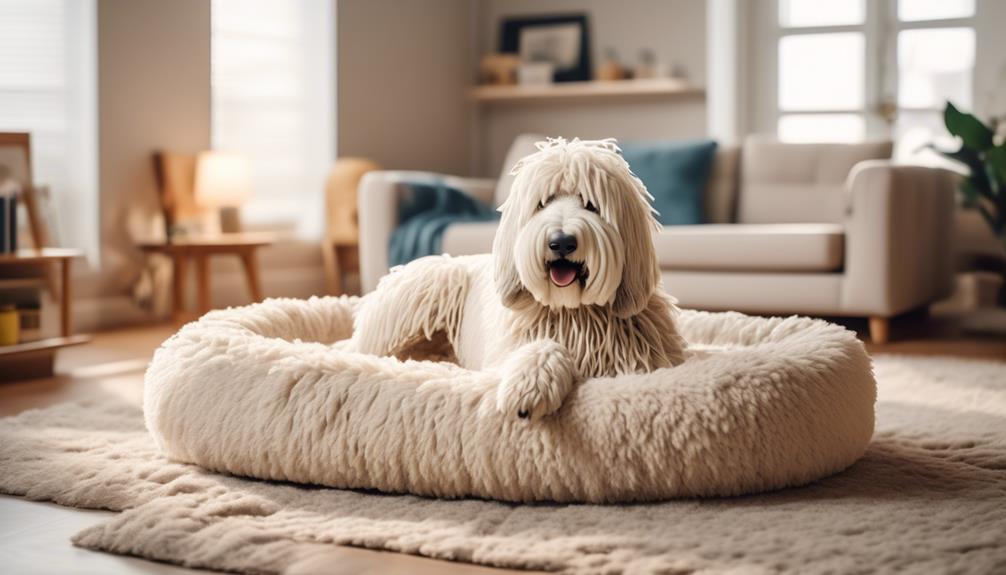
After learning about the origin and purpose of the Komondor dog as a livestock guardian breed, it's important to consider their adaptability for apartment living.
Despite their large size, Komondors can adapt well to apartment living if certain factors are taken into consideration. While size alone shouldn't be the sole determinant for apartment suitability, energy levels and space requirements should also be considered.
Prioritizing qualities such as quietness, low-energy, and good manners can contribute to a harmonious living environment. Additionally, it's important to consider factors such as trainability and temperament when choosing a dog for an apartment.
Novice owners may benefit from training resources, while experienced owners may be better suited for certain breeds. However, it's worth noting that some dogs aren't well suited to apartment living.
Choosing the Right Komondor for Your Lifestyle
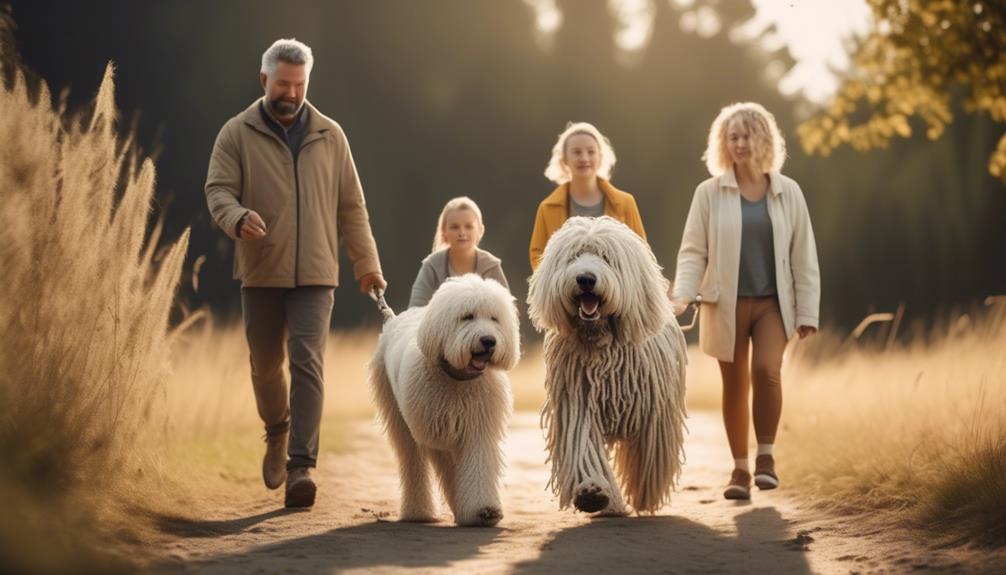
When selecting a Komondor that suits your lifestyle, consider various factors such as your activity level, living situation, and experience as a dog owner.
Komondors are large and energetic dogs that require a significant amount of exercise. They're best suited for owners who can provide them with regular physical activity, such as long walks or a securely fenced yard for them to play in.
Additionally, Komondors are known for their protective instincts and require a confident and experienced owner who can establish themselves as the pack leader. They aren't recommended for first-time dog owners or those who aren't familiar with handling strong-willed breeds.
Characteristics and Health of the Komondor Breed
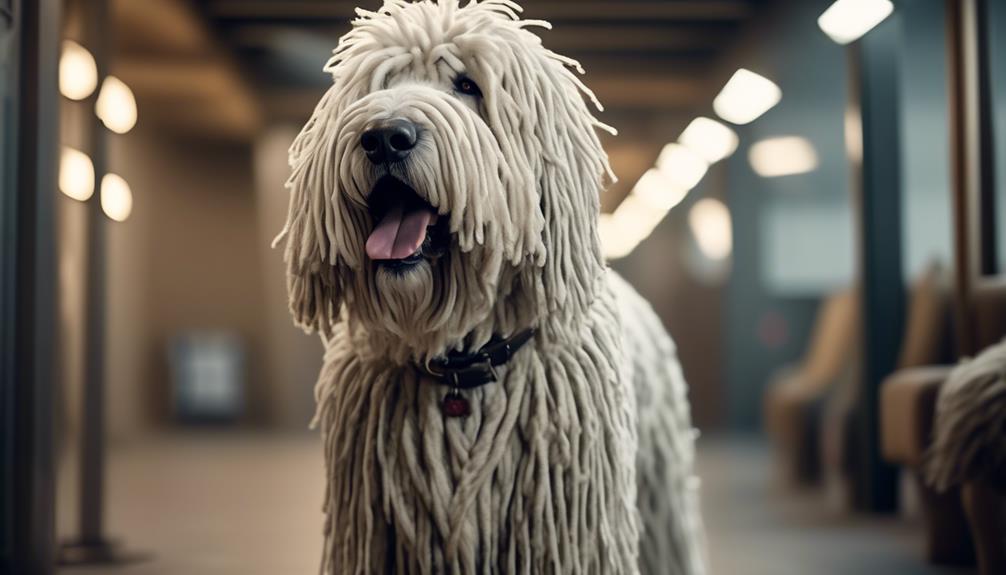
Komondors, known for their distinctive corded coats, are a large and robust breed originating from Hungary. They have several key characteristics and health considerations that potential owners should be aware of. In terms of size, male Komondors can stand 27.5 inches tall and weigh 100 pounds or more, while females are slightly smaller at 25.5 inches tall and 80 pounds or more. Komondors develop a calm and devoted personality as they mature, but they are also intelligent and independent. It's important to note that they have a strong protective nature and may display aggression towards other dogs. In terms of health, Komondors are generally a healthy breed, but they can be susceptible to conditions such as hip dysplasia, entropion (inward rolling of the eyelid), and gastric torsion (bloat). Responsible breeding, regular veterinary care, and a nutritious diet are essential for reducing health risks.
| Characteristic | Description |
|---|---|
| Size | Male Komondors: 27.5 inches tall and up, 100 pounds or more <br> Female Komondors: 25.5 inches tall and up, 80 pounds or more |
| Personality | Calm and devoted, intelligent and independent, strong protective nature, may display aggression towards other dogs |
| Health | Generally healthy, but can be susceptible to hip dysplasia, entropion, and gastric torsion. Responsible breeding, regular veterinary care, and a nutritious diet are crucial. |
Care and Feeding of Komondor Dogs
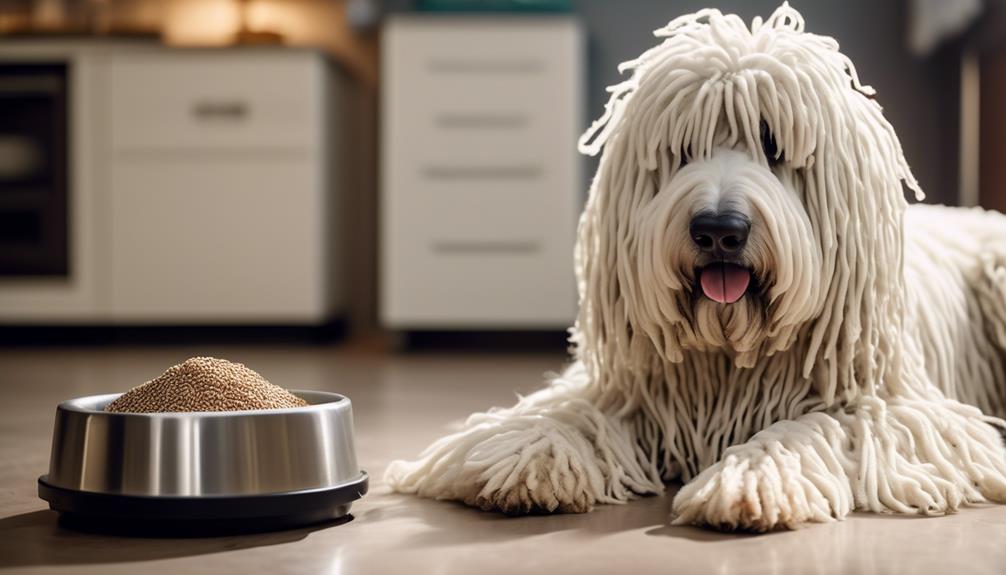
Now shifting our focus to the care and feeding of Komondor dogs, it's important to understand how to properly meet their needs. Here are three key aspects to consider:
- Training and Exercise:
- Komondors are receptive to training when they're young, but can become stubborn learners as they mature.
- Training should be enjoyable and not rely on force or repetition.
- Regular exercise, such as two or three short walks daily, is essential to keep them physically and mentally stimulated.
- Dental and Nail Care:
- Proper dental hygiene and nail care are crucial for Komondors.
- Regular brushing of their teeth and trimming of their nails should be part of their grooming routine to maintain good overall health.
- Feeding and Diet:
- Komondors' dietary needs vary based on factors like size, age, and activity level.
- Highly active Komondors will require more food.
- Feeding two or three small meals throughout the day can help prevent bloat, a life-threatening condition.
- It's important to consult with a veterinarian to determine the most suitable diet for your Komondor.
Maintaining the Unique Coat of a Komondor
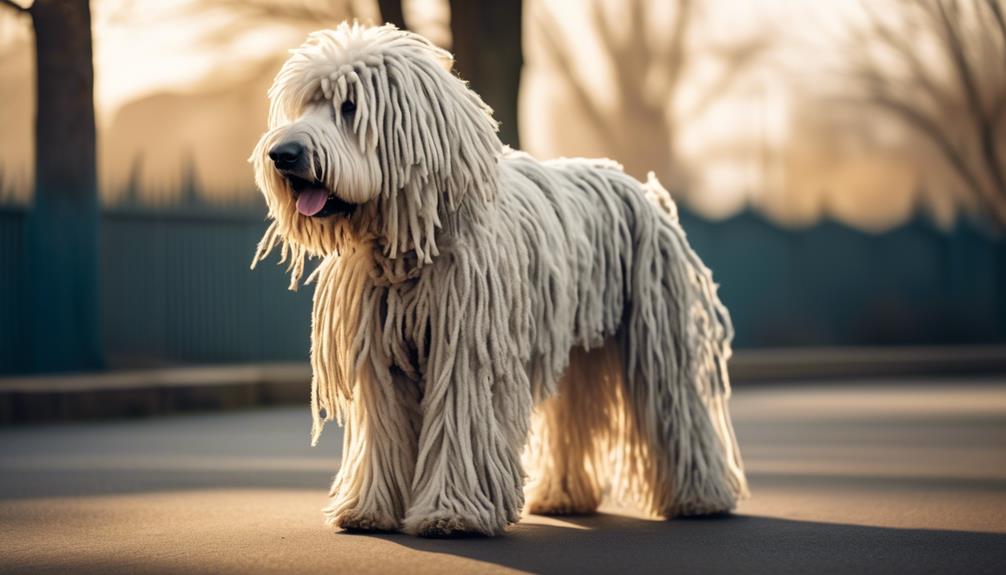
Regular maintenance is essential to preserve the unique coat of a Komondor. The Komondor's coat is one of its most striking features, consisting of long, corded strands that resemble dreadlocks. To keep the coat looking its best, regular separation of cords and trimming around the mouth is recommended.
This helps prevent dirt and matting, which can be a common issue due to the coat's texture. Additionally, regular grooming sessions are necessary to ensure the coat remains healthy and clean. Komondors are known for their low-shedding coats, but they still require regular brushing to remove any loose hair or debris.
Komondors and Family/Other Pets: Considerations and Recommendations
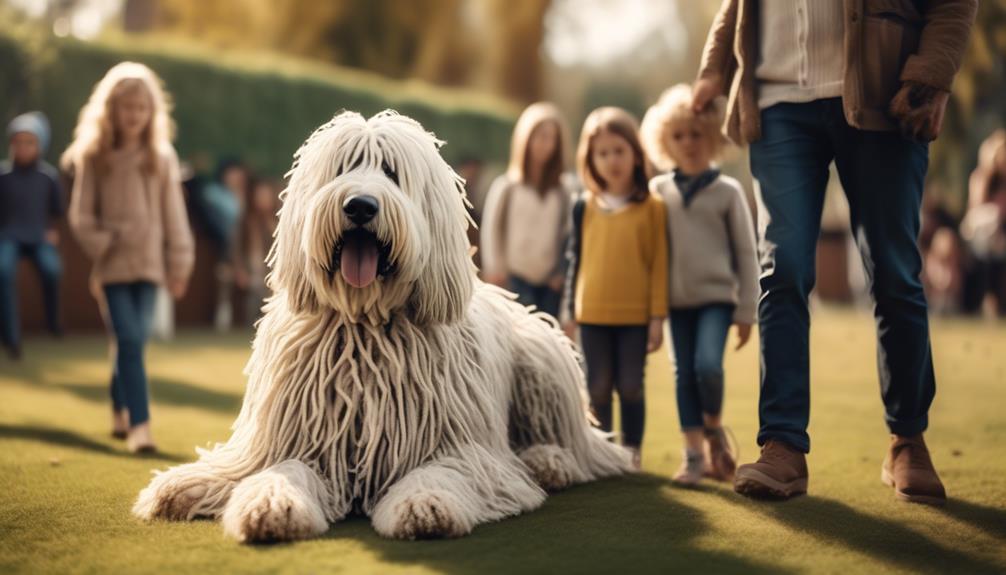
When considering adding a Komondor to your family or introducing them to other pets, there are important considerations and recommendations to keep in mind.
- Supervision is crucial when Komondors are with children. While they can be good companions for children within their own family, they may struggle with visiting children. Homes with older children are better suited for Komondors, and they should never be left alone with young children.
- Reach out to rescue organizations for available Komondors and adoption requirements. Komondors may be acquired without proper understanding of responsibilities, resulting in dogs needing adoption or foster homes. While breed-specific rescue for Komondors may be challenging due to rarity, exploring rescues that cater to various dog breeds, including Livestock Guardian Dog Breeds (LGD), can be beneficial.
- Reputable breeders are committed to breeding healthy, well-socialized puppies. They screen breeding stock for health problems and socialize puppies from a young age. They also provide lifetime support to puppy owners. Avoid backyard breeders who prioritize profit over producing healthy, well-adjusted dogs.
Frequently Asked Questions
Are Komondors Hypoallergenic Dogs?
No, Komondors are not hypoallergenic dogs. They have a dense, corded coat that can trap allergens such as dander and pollen. Individuals with allergies may experience symptoms around this breed.
How Much Exercise Do Komondors Need on a Daily Basis?
Komondors need a moderate amount of exercise on a daily basis. They should have two or three short walks and some mental stimulation to keep them happy and healthy. Regular exercise is important for their overall well-being.
Can Komondors Be Left Alone for Long Periods of Time?
Yes, Komondors can be left alone for long periods of time, but it is not ideal. They are a breed that thrives on companionship and may become anxious or destructive if left alone for extended periods.
Are Komondors Easy to Train?
Komondors can be challenging to train as they mature. Their intelligence and independence can make them stubborn learners. Training should be enjoyable and force-free. Early socialization and consistent, positive reinforcement methods are essential for successful training.
Do Komondors Have Any Specific Dietary Requirements?
Komondors have specific dietary requirements based on factors like size, age, and activity level. Highly active Komondors may need more food, and feeding two or three small meals throughout the day can help prevent bloat. Consult with a veterinarian for the most suitable diet.
What Are the Characteristics of the Komondor Dog Breed Compared to the Kromfohrlander Dog Breed?
The Komondor dog breed is known for its large size and protective nature, while the Kromfohrlander dog characteristics include being small in size and adaptable. The Komondor has a distinctive corded coat, while the Kromfohrlander has a smooth, medium-length coat. Both breeds are loyal and intelligent.
Conclusion
In conclusion, the Komondor is a remarkable breed with unique characteristics and traits.
Their adaptability to apartment living, calm and devoted nature, and strong protective instinct make them exceptional companions.
While they may require proper care and attention to their health, the rewards of owning a Komondor are immeasurable.
Whether you're a first-time owner or experienced with dogs, the Komondor's distinctive qualities and needs make them a truly special addition to any family.




